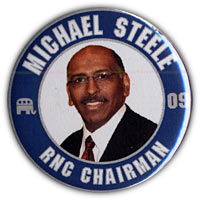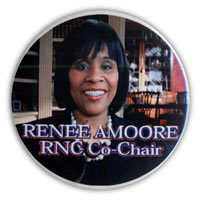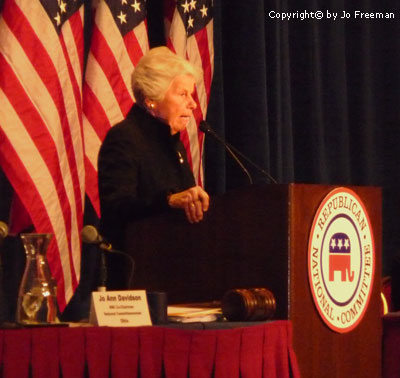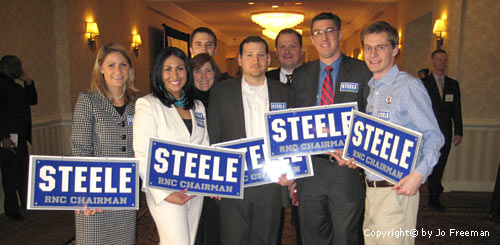|

by Jo Freeman
posted to SeniorWomen Web, January 31, 2009

African-Americans achieved a visibility at the 2009 winter meeting of the Republican National Committee, held in Washington DC January 28-30, not seen in the memory of anyone there, and perhaps not ever on the national level. While only three of the 168 RNC members are black, there were more black faces among those roaming the halls and seated among the guests than there were delegates to the Republican National Convention last September.
RNC members elected Michael Steele to be the first black chairman of the GOP on the sixth ballot, in a meeting with all the excitement and suspense lacking in the national nominating conventions since 1952. Steele had served as chairman of the Maryland state Republican Party before being elected Lt. Governor in 2002. He lost his 2006 Senate race to the Democrat.
The first African American to seek the RNC chairmanship was Arthur Fletcher in 1977, as one of five contestants in a race that elected William E. Brock 3rd after three ballots.
The RNC consists of a National Committeeman, a National Committeewoman and the chair of each "state" party. In addition to the 50 states the party recognizes 6 non-state entities (e.g. District of Columbia, American Samoa, etc.)
 One-third of the candidates for the top two RNC offices were black. The day before the election two of the six announced candidates for chairman were black – Steele and Ohio’s former Secretary of State Kenneth Blackwell. One of the three candidates for RNC co-chairman was black: Renee Amoore, Deputy Chair of Pennsylvania’s Republican Party. One-third of the candidates for the top two RNC offices were black. The day before the election two of the six announced candidates for chairman were black – Steele and Ohio’s former Secretary of State Kenneth Blackwell. One of the three candidates for RNC co-chairman was black: Renee Amoore, Deputy Chair of Pennsylvania’s Republican Party.
The chairman and co-chairman are the only elected officers which are full-time paid employees of the RNC. The Rules of the Republican Party require that they be of "the opposite sex." Traditionally the job of co-chairman (its official name) was leader and organizer of Republican women. The title was created in 1971 but the paid job dates from the 1930s when both major parties were actively recruiting and organizing women.
 RNC Co-Chair Jo Ann Davidson chaired the election meeting
RNC Co-Chair Jo Ann Davidson chaired the election meeting
Steele’s election constituted a blue state revolt against the incumbent chairman, Michael Duncan of Kentucky, who had been chosen by President George Bush to chair the RNC in 2007. While voting was by secret ballot, an examination of the vote shifts after each ballot and the comments of those present indicate that Steele’s final 91 votes came mostly from states who lack Republican representation in Congress, and in particular from those who lost it in the last two elections. In his acceptance speech, Steele only thanked "the islanders" – the five non-states on the RNC whose citizens can’t vote for President.

When the party elects the President, he chooses the party chief, even though the chairman must still be officially elected. When the party loses, anything goes. The Democratic National Committee had contested elections in 2005 but at the DNC’s recent winter meeting on January 21, none of those chosen to be DNC officers had any competition. At the RNC meeting all four top offices were contested, though only the race for chairman received any attention in the press.
The political views of the candidates may have been on the minds of the RNC members, but they weren’t discussed publicly. All candidates called themselves conservatives, but if placed on a political spectrum within the party, Steele would be at one end and Kenneth Blackwell would be at the other.
Steele was once a member of the Republican Leadership Council, founded by "moderates" in 1993, which believes in "less government interference in individual lives." Blackwell was endorsed for RNC chairman by Phyllis Schlafly and included in his campaign biography numerous affiliations with right-wing groups.
While race was never raised as a concern, it lurked just underneath the surface. When Blackwell, who ran last, withdrew after the fourth ballot, he endorsed Steele, telling the RNC to "make good on the promise of Lincoln." On the next ballot Steele’s total increased by 19 votes.
Only five of the six men running for RNC Chairman on January 29 had their names placed into nomination on January 30. Chip Saltsman of Tennessee could not get support from the two members in each of three states required by the Rules to get on the ballot. His campaign imploded after he sent a CD to RNC members in December containing a song called "Barack, the Magic Negro." Sung to the tune of "Puff, the magic dragon," it had been aired by Rush Limbaugh in 2007. Limbaugh got a pass on his use of this racially loaded parody, but Saltsman lost all of his support. As of January 29 he was the only candidate without any pledges from RNC members.
The African American candidate for co-chair, Renee Amoore, withdrew after Steele was elected chairman, before her name could be placed into nomination. She said it was because she and Steele were from contiguous states (Pa and Md) and the RNC preferred geographic diversity in its leadership.
Renee Amoore withdraws from the race for co-chair
However, it was hard not to read "racial diversity" as the preference. Even though the co-chair works behind the scenes and is not normally the face of the party, electing African Americans to both the top positions might have been too much for a party with only 2.2 percent of the delegates to the 2008 national nominating convention identified as black.
That left the co-chair race between two women to be settled with one ballot. Jan Larimer, National Committeewoman from Wyoming, won with 99 votes. The loser, Tina Benkiser, chairs the Republican Party of Texas. She had run on a ticket with Blackwell.
|